David Klein's Blog, page 64
June 7, 2020
THE SUITOR Has My Attention
I’ve posted less these last few weeks because my attention is occupied elsewhere. One focus of attention has been finishing my novel, THE SUITOR.
I’ve gone back and forth with my agent on some potential changes that might clarify, crystallize, and strengthen the story. I’ve spent hours each day writing and rewriting, trying to solve those nagging problems of narrative and character motivation. Publishing houses don’t offer much editorial support these days; they want polished manuscripts that are ready to sell.
Yet every writer needs a good editor. My agent has been helpful. She raises questions, offers ideas, carefully critiques. It’s a positive part of the writing process.
I finished another draft the other day and now the novel is in the hands of a trusted reader whose opinion I greatly value. Early returns are good. I may have something here.
The last thing I did before passing the manuscript along was to run a spelling and grammar check in Word. I got these statistics.
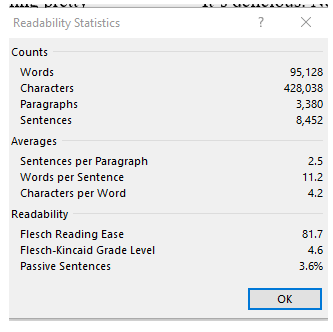
Most surprising to me is the Flesch-Kincaid Grade Level: 4.6. That means a fourth grader could understand the sentence structure and language I use. Of course, there is no way a fourth grader could read and understand the story, or even have interest in it. I guess I write in simple sentences, but that doesn’t mean simple meaning or simple story.
I’ll pat myself on the back for not writing many passive sentences, only 3.6 percent. One of the first rules of writing: use the active voice. There are a few, but not many places where the passive voice is preferable or useful. I think it’s 3.6 percent of the time.
Word count: 95,128. That’s my sweet spot. My shortest novel was 87,000 words, my longest 105,000.
The post THE SUITOR Has My Attention appeared first on by David Klein.
June 5, 2020
Racism: A Personal Introduction
BUFFALO, NY, 1960s. I’m seven or eight years old, the fourth of five children in my family, three girls, two boys. We live on a busy street in a wood-structure, single-family house in a white neighborhood.
At the end of the block is the Catholic elementary school I attend. I have no black classmates. I don’t know any black people.
Next door to us is a two-family. The Millers move in on the second floor flat, with three boys, the youngest, Paul, a year older than me. He is bigger than me, harder, more worldly. He goes to the public school. He has a dog.
I’m sitting on the concrete stoop with Paul and his dog. Right in front of us on the sidewalk an old woman walks past dragging a two-wheel shopping cart. The dog goes berserk, barking and leaping at the woman. Paul holds the animal by the collar. I shrink back.
The woman hurries past as fast as she could, which isn’t fast. I see the alarmed expression on her face.
Paul is laughing. He says, “I trained him to do that.”
“Do what?”
“Bark at niggers.” [This is the one and only time I will write that word, although the word slid off a lot of white tongues in those days, but not in my family’s household. More on the usage of this word.]
I don’t think it even registered on me the woman was black, only that she was old. I was looking to see what was in her grocery bags. If I had noticed her race, I’m not sure I noticed the difference, or that she was someone a dog might be trained to bark at.
But now I’ve learned something.
There is no talk of race in our school: God, math, and grammar—that’s what the nuns focus on. There isn’t much talk about race or racism from my parents, either. They had five children in less than seven years; they are very busy. They aren’t communicators.
The black neighborhood had encroached to four or five blocks away from where we live. Encroached is the appropriate word here: the black population is extending its geographic boundaries into historically white neighborhoods. The two worlds come together at Delaware Park and the Buffalo zoo. It’s where I make my first black friends, and enemies.
The oldest Miller brother, Harry, has a crush on my oldest sister, Susan. He doesn’t have a chance. But he hangs around us and sometimes he puts my little sister, Nancy, on the handlebars of his bike and I ride my shiny red stingray and we ride in the zoo or the park.
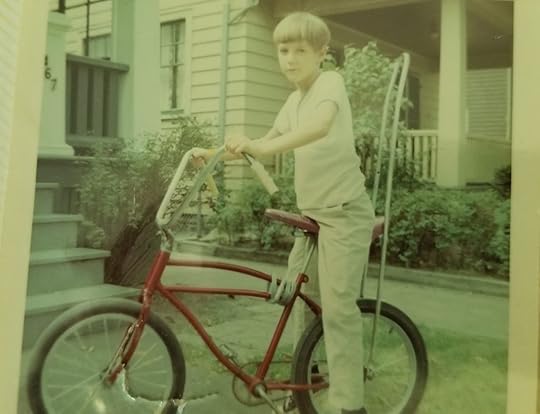
One day in the zoo a group of black boys on bikes spots us. Some of them are doubled-up too. Harry says to get pedaling, and immediately I’m scared. The boys are in pursuit. We peddle hard, out of the zoo, through the park. I can’t keep up with Harry who reaches the busy intersection of Parkside and Amherst Streets just before the light changes and whizzes across.
I’m stuck, less than a block from my house, as cars fill the intersection. The black boys on bikes catch up to me. They surround me. I’m eight-years-old and have a cast on my left arm from when I broke it over the summer. I’m already crying. I’m begging them not to hurt me. They are older, bigger, numerous. Dark.
Their leader says, “We don’t hurt you if you give us your bike. I’ll count to three.”
When he reaches two I’m off my bike. True to their word, they don’t hurt me, but they ride off with my new bike.
Now I’ve learned something else, with more to come. I will have a lot of unlearning to do.
The post Racism: A Personal Introduction appeared first on by David Klein.
June 3, 2020
THE WORLD ACCORDING TO GARP, John Irving
During the period of COVID-19, I’ve been re-reading novels from a list of twenty-five of The Most Important Novels in My Life. Next up: THE WORLD ACCORDING TO GARP.

Published in 1978, when I was in college, the first time I attempted to read Garp I put it down. A few years later I started reading it again, and this time I couldn’t put it down. What changed? Sometimes you’re just not ready for a book.
What a cast in his novel: Garp’s mother, Jenny Fields, a despiser of lust who becomes a feminist icon and best-selling author. Roberta Muldoon, former NFL tight end turned trans. Garp’s wife, Helen, who pays the most devastating price for her adultery, while Garp is hardly punished for his. And Garp–the writer and overprotective parent.
The novel is packed with lust, sex, violence, and tragedy. Irving has a bold and confident voice, sometimes overbearing, but how many writers can make you crack a smile over tragedy?
I found some parts dull. The story-within-a-story sections, written by the author T.S. Garp, were less than compelling. That doesn’t reflect well on Garp or Irving as writers. But for the most part, the novel hums along in epic, Dickens-like fashion, one anecdote after another, spanning the entire life of T.S. Garp.
One of the reasons this novel made my list is the energy of the narrative style. I found myself imitating Irving in some of my earlier writing efforts. Therefore, he was a significant influence on me. I also have a spot in my heart for novels about writers. We all have a lot in common. I don’t think I’ll ever have the nerve to make one of my characters a writer.
I think two novels that Irving wrote after Garp, THE CIDER HOUSE RULES and A PRAYER FOR OWEN MEANING, were more powerful and meaningful for me. But I might never have gotten to them if I hadn’t read Garp first.
5/5 Stars.
The post THE WORLD ACCORDING TO GARP, John Irving appeared first on by David Klein.
June 1, 2020
The Most Important Novels in My Life
I have set myself a task for 2020: reread the ten most important books in my life. To qualify for the list, the novel (or novella or short story collections; I’m including those also), must meet one or more of the following criteria:
It was so profound and meaningful to me that I’ve read the novel multiple times.It significantly influenced my own development as a novelist.The experience of reading the novel is inexorably linked to and illuminates a moment or period of time in my life.
It’s going to be challenging to pick the ten books. I’m not concerned that I’ve forgotten any important book, because if I have, then that book by definition wouldn’t qualify for the list. I’ve started with 25 titles, from which I must cull down to ten.
Why am I doing this? I’m interested in how the passage of time and accumulation of life experiences have changed how I feel about a book that I once placed on a high pedestal. Has the book stood the test of time? Have I? What’s changed?
For now, I’m listing my initial list of 25, in no particular order, and without explanation. When I get down to ten, I will provide context as to why I chose each one to read again.
UPDATE: I’ve re-read some on this list of 25 and updated their status below
THE WORLD ACCORDING TO GARP, John Irving. Prob won’t crack top ten. I think I liked THE CIDER HOUSE RULES and A PRAYER FOR OWEN MEANY better.AMERICAN PASTORAL, Philip RothSELF-HELP, Lorrie MooreA FARWELL TO ARMS, Ernest HemingwayA VISIT FROM THE GOON SQUAD, Jennifer EganTHE SLAP, Christos TsiolkasTHE EXORCIST, William Peter BlattyDUNE, Frank HerbertCAT’S EYE, Margaret AtwoodTHE UNBEARABLE LIGHTNESS OF BEING, Milan KunderaTHE ROAD, Cormac McCarthyIN THE GARDEN OF NORTH AMERICAN MARTYRS, Tobia WolffLITTLE CHILDREN, Tom PerrottaSMILES ON WASHINGTON SQUARE, Raymond Federman10:30 ON A SUMMER NIGHT, Marguerite Duras. Off the list, didn’t stand the test of time. Pretentious, obtuse, overwritten. THE CATCHER IN THE RYE, J.D. SalingerA PALE VIEW OF THE HILLS, Kazuo IshiguroLOVE IN THE TIME OF CHOLERA, Gabriel Garcia Marquez. Likely top ten. It’s the writing, stupid. Many have imitated, but there’s only one GGM. BELLEFLEUR, Joyce Carol OatesTHE HOURS, Michael CunninghamLEGENDS OF THE FALL, Jim HarrisonTHE THINGS THEY CARRIED, Tim O’BrienMARIETTE IN ECSTASY, Ron Hansen. Likely top ten. The writing and language is incredible. The setting of the convent like another world.THE ACCOMPLICES, Georges Simenon. Certainly not a great novel, but it is a short, fascinating character study that made a strong impression on me.WHAT WE TALK ABOUT WHEN WE TALK ABOUT LOVE, Raymond Carver
The post The Most Important Novels in My Life appeared first on by David Klein.
May 25, 2020
Today I Flew the Flag, Not Upside Down
Julia asked if I was putting the flag out today. I realized I should. I flew it for one reason only: It’s Memorial Day and I wanted to honor those who died while serving in the U.S. military. They deserve this honor.
Otherwise, I haven’t been flying the flag. The last time I did, in 2016, I flew the flag upside down as a call of distress. I got some pushback over that.
I’ve been thinking a lot about our flag and our country recently, especially in the time of COVID-19. I’ve been upset and disturbed at what I see and hear and read. I’ve been living in a socially-isolated bunker with my family, while our nation is at war with itself.
I’m on the side that believes the president is a cancer to this country–and to the world at large–and his sycophants and voters are terribly wrong on what and who our country should represent.
Our challenge is that we are such a diverse nation, in almost every imaginable way. People have different beliefs, different goals, different views of the world. We’re of different races. We have vastly different socioeconomic profiles. We listen to different voices in the media and in our own heads. We live in different climates and geographies. There is a powerful and elite ruling class, and there is a lot of everyone else.
This is the country we live in. We have our flag, which is the symbol of our nation. But it no longer seems that a single symbol can represent the magnitude and diversity of our country–unless it accounts for that magnitude and diversity.
Today I looked up the definition of a patriot: a person who loves, supports, and defends his or her country and its interests with devotion.
A lot comes down to what our country’s “interests” are. I want to be a patriot. I want to have that passion. I want to love, support, and defend my country a lot more than I do. What I really want is our country to move in a direction of empathy, and inclusiveness, and fairness. To me, those are the foundational interests that should underpin our country. That’s what our flag should represent.
I’m no leader of a cause or of people. But I can vote. I can do things for others. I can demonstrate empathy.
Except I’m having such a hard time being empathetic toward corrupt government leaders, and white supremacists, and greedy billionaires, and climate change deniers, and second amendment freaks, and people who want to take away women’s rights, and those who try to suppress voting or deny healthcare. Such a lack of empathy I’m demonstrating. I guess that means I’m not the good American I want to be.
But I did fly the flag today. It’s Memorial Day. Hundreds of thousands of people have died in the service of our country, whatever that country is. I honor you who have fallen. I don’t know if I could have done the same.
The sun has set. I must take down the flag. I hope I have reason to fly it again soon, and not upside down.
The post Today I Flew the Flag, Not Upside Down appeared first on by David Klein.
May 24, 2020
Memorial Day 2020
May 24, 2020. Memorial Day Weekend. This is the front page of the New York Times today: 100,000 thousand dead so far in the United States from COVID-19. So far.
The sub-head to the story states, “They Were Not Simply Names on a List. They Were Us.”
There will be more deaths. Probably many thousands more. Compare this number to the number of U.S. deaths in war.
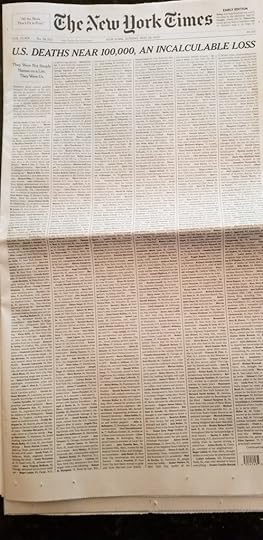
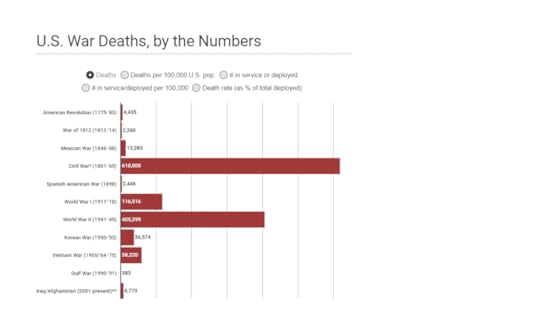
Almost twice as many have died from COVID-19 as died in Vietnam. Almost as many as World War I. We’re working our way up to World War II.
But has there been any type of coordinated national response to the COVID-19 outbreak the way there had been for World War II or other wars? An “all hands on deck!” rallying cry? Not at all. Although, for a week, maybe two, during the earlier days of the pandemic, our dear leader Donald Trump called himself a wartime president. That spin didn’t last long, what a surprise.
Also not a surprise is that only 17 percent of Americans have faith in the federal government doing the right thing. That’s an all-time low.
All any of us can do is the best we can do. Act responsibly in an attempt to not spread the virus or catch the virus. Hope for the best, but with the leadership of this country, expect the worst.
I honor all those who have died from COVID-19. I honor those who have died in wars. Too bad I can’t bring myself to fly the flag.
The post Memorial Day 2020 appeared first on by David Klein.
May 19, 2020
My First Novel Was a Disaster
I’m on page 38 of 327 pages of a novel I’m reading and I want to put it down. I’m uncomfortable reading. Anxiety is building in me. Anguish weighs me down. Even shame.
And yet — I also experience a sense of wonder.
The novel is called THE PETTING ZOO, and it’s the first novel I wrote, 30 years ago. I came across the manuscript — wasn’t sure I still had it — when I was going through old papers as a way to stay occupied and entertained during this period of coronavirus and social distancing.
There was a time when I truly believed I would never write a novel. I was still unpublished at that point. I was exclusively a short story writer, basking in my collection of stories that served as my master’s thesis and helped me earn an MFA.
A novel was an insurmountable project. I would never do it. I had no interest. And then I started writing and my vision got longer and the next thing you know . . .
It took about a year to write the first draft. Another year of rewriting until I thought the novel was finished. I was proud — and nervous. I wanted my novel published. I wanted to make a name for myself as a literary figure. I submitted to agents and publishers. I received rejection after rejection.
But then I received a response from a publisher who said THE PETTING ZOO was an important novel and absolutely had to be published. My heart soared — but not for long. Turned out this response was only from an editorial assistant, and the actual publisher didn’t share her passion for my work. Another rejection.
Eventually, I gave up on THE PETTING ZOO, and went to work on another novel. Not sure how I could have made the decision to try again after such a sense of failure and so much rejection, but I’ve been making that decision all my writing life, as most writers do, if they’re still going to write.
I don’t put THE PETTING ZOO down on page 38, like I’m tempted to. I push on, hoping it gets better. By halfway through, I begin skimming to reach the end. What I’m grappling with: this novel is bad. Real bad.
I’m not even sure what the story is about. Something involving a romantic drifter who believes in love at first sight and falls for a conflicted woman currently being gaslighted by another man. Plus several subplots including one about an advice columnist and another about an incestual relationship.
The novel is both overwritten (passages of cringe-worthy turgid prose) and underwritten (undeveloped characters with vague motivations). The narrative voice lacks control; the point-of-view strays. A lot happens plot-wise, and it’s too long.
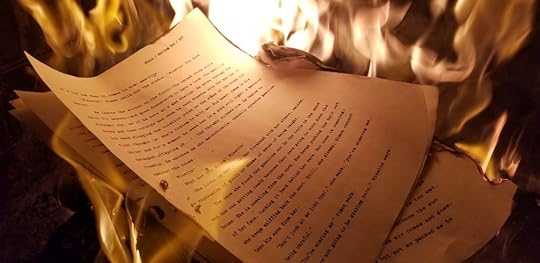
My anxiety and shame — where does that come from? There was a time when I thought this novel was going to be my breakout — and I actually let, even encouraged people to read it. Some praised my work (they must have been gaslighting me, like one of the characters from the novel). No one told me my writing was bad. Well, one person tried to tell me, in an indirect way, and I responded by eventually breaking up with her.
And yet . . . I recognize the nuggets of promise in the novel. I had a knack for plotting, structure, and pace, which have always been my writing strengths. Some scenes were strong enough to be the foundation of future scenes in future work. I could dig into the emotional states of my characters.
So all that is on the positive side of the ledger. But what mostly rescues me from despair is letting the past be the past and realizing how far I’ve come as a writer. How much I’ve learned and grown and honed my craft. How much better I’ve gotten.
Last year, I took the time to re-read my two published novels, STASH and CLEAN BREAK, and when I finished I was mostly satisfied. I’d written good books. That’s all I’ve ever wanted to do. And have readers like them.
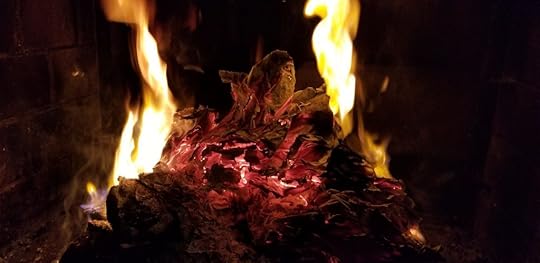
As for THE PETTING ZOO: I don’t need to save it. I’ll certainly never read it again and I’d prefer if no one did. This manuscript doesn’t need to become part of my “papers” collected after I’m dead. Ha, ha. I’m going to make a fire today. I’ll add the pages to the flames. I’ll watch them burn.
The post My First Novel Was a Disaster appeared first on by David Klein.
May 15, 2020
COVID-19 Reaches the Cottage
My calendar has been a lot less full these days. It’s the nature of my lifestyle during COVID-19 and my life in general as a writer: I have unstructured time that I use the best I can.
Today I had an alert from my calendar: this is the weekend I’m supposed to open the family cottage.
The cottage is an inherited asset shared among my siblings and is a lifelong gathering and living place for the Klein family — summer only. Its located in Thunder Bay, Ontario, just a block from Lake Erie, just fifteen minutes from the U.S./Canada border, a full 30-minute drive from where I grew up in Buffalo.
 New cottage
New cottageEvery year since my father passed away in 2014, and a number of years prior as well, I make the five-hour journey to Canda to open the cottage. My sister Susan, her partner John, and I were a team. Sometimes Harriet came with me. We took down storm windows and arranged yard furniture and hung the hammock. We wiped stuff down. We inspected for winter damage and made needed repairs. Then to the Brimstone down the road in Ridgeway for beer and food.
It’s a half-day of work and a weekend of camaraderie. My brother Peter and his wife Ann have a place across the road. The beach is a block away. Maybe when I was younger I’d be swimming near Memorial Day, but now a walk along the shore is inspiring enough.
Growing up, I spent every summer in Canada. It was a world away from Buffalo, like a summer camp with your family and best friends. The earlier Klein cottage was much more rustic: handbuilt by my father and his buddies, slowly submerging into the ground. That’s the one I grew up in.
 Old cottage
Old cottageYears later, I get to the new cottage in May to open it for the season, in October to batten it down for winter, and in between for a weekend or two to relax: swimming, tennis, jigsaw puzzles, riding bikes, being with family. We try to intersect our visits, my sisters and I, so we all get to see each other. Oh, and cocktails and beer and the other accouterments that make a family party.
I don’t need to go to the cottage often, but I do need to go. When I travel there I bring a lifetime of memories and a fondness for this summer getaway that’s embedded in my heart.
The only problem: there’s no cottage opening this weekend. The border between the U.S. and Canda is closed. I’m living in the time of COVID-19. This is my coronavirus diary.
The post COVID-19 Reaches the Cottage appeared first on by David Klein.
May 8, 2020
Croquet: Sport in the Time of Pandemic
The tennis nets around town have been taken down. Solitary running and my home gym set up only goes so far. I need competition. I need a sport to play, one conducive to social distancing. Croquet anyone?
I have an old backyard croquet set I inherited from my father. It’s very ordinary, but I guess you could still call it an heirloom. The mallet heads are grass-stained and dented, and you have to tighten the handles after a few shots. Some of the wire wickets are hopelessly bent. Amazingly, the balls remain in good condition. And such great color options: sometimes it’s hard to choose.
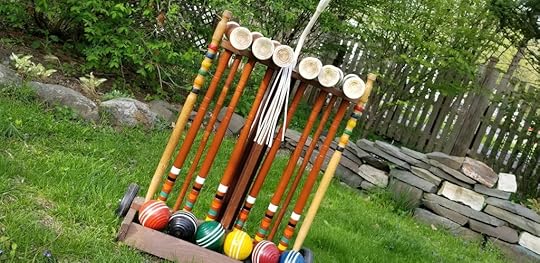
I’m playing with my friend Jim. It’s a perfect spring day, with dandelions and clover blooming on my backyard pitch. We set up a challenging course, with wickets stuck into the ground on uneven surfaces or on crazy angles or next to rocks we’ll attempt to use as backboards. We make a lot of house rules that we negotiate on the fly. It’s pretty wild stuff for such a tame game.
But for us, the game isn’t so tame. Jim and I used to ride mountain bike trails: rocks and roots, jumps, logs, screaming downhills, tortuous climbs. Injuries and age tamped that down a bit. But when we rode we rode hard, we were committed, and we had a lot of fun, and now we try to bring that adrenaline and performance to the extreme sport of . . . croquet.
We consult each other on shot execution and playing strategy—yes there is strategy in croquet. Example: Go for the wicket on a long shot and risk traveling too far afield, or lay up for an easier tap through on your next turn? Strike the other ball to gain an extra shot, or keep playing through in an effort to stay ahead? It’s a one-on-one race to the finish. You better not get anxious.
We played with gusto. We encouraged each other. We went for the risky shots, but in a socially-distanced, contactless sport, why not take risks? The pain of messing up a shot doesn’t linger too long, unlike mountain bike falls that lead to a broken ankle or bruised ribs.
Croquet is all about shot-making. When I hit a bad stretch of missing almost everything, I start experimenting with my swing to break the funk. I’m way behind.
And then I have a chance to make a move. Jim faces an impossibly long shot to get through the next wicket, a sharp angle across the forbidding terrain of my weedy, bumpy lawn. He takes his time and lines up his shot like he’s on the eighteenth green needing a birdie to win the U.S. Open. Naturally, I snicker.
He strikes the ball and it zips along a ragged trajectory, pops over a bump, and passes perfectly through the center of the wicket. An incredible shot! We love games when there’s a shot made like that. We shout and cheer, both of us. I turn toward him, ready to hug and celebrate such skill, such luck, and then we both remember: social distancing, no touching. We tap the tip of our mallets.
He wins that game handily, and then a couple more before I mount my comeback. And then we have a few beers, sitting six feet apart.
The post Croquet: Sport in the Time of Pandemic appeared first on by David Klein.
May 6, 2020
THE ACCOMPLICES, Georges Simenon
I recently made a list of the 25 most important novels in my life and have been rereading them to see how well they’ve stood the test of time. I had included this short, harrowing crime novel on my original list. I must have first read it when I was a teenager or in my early twenties, and the impression it made on me was indelible.
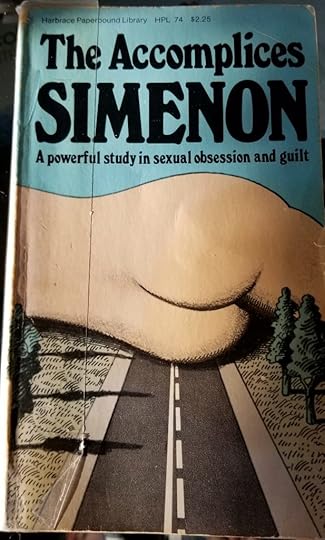
The novel’s protagonist — Joseph Lambert, a successful business owner — causes an accident that kills a busload of schoolchildren in the small town in France where he lives and works. The opening line is “It was brutal, instantaneous.”
Lambert was distracted at the time of the accident because his hand was up the dress of his mistress sitting in the seat next to him. Lambert drives off, his mistress hardly bats an eye, and so begins his struggle with his conscience.
First published in 1955, the cover of my version shows a woman’s crudely drawn ass lying across the road and includes the accurate description “A powerful study in sexual obsession and guilt.”
Lambert is as unlikeable a character as there is fiction. He cares little for his wife, he has sex with his secretary as well as other women, he’s obnoxious and insulting when he’s drunk, and, of course, he left the scene of a horrific accident for which he is responsible.
And yet, it’s Simenon’s mastery as a writer that also makes Lambert, if not sympathetic, then at least fascinating. The author has a deep understanding of his characters’ psyche and motivation, and the reader eagerly follows along as the novel progresses quickly to its inevitable and surprising conclusion.
This must have been one of those first novels I read in which the main character is an anti-hero. Does it still belong on my list of 25? I’m still undecided about that. It’s certainly not a great novel, but the psychological aspects are fascinating and Simenon has definitely influenced me as a writer.
4/5 stars.
The post THE ACCOMPLICES, Georges Simenon appeared first on by David Klein.



